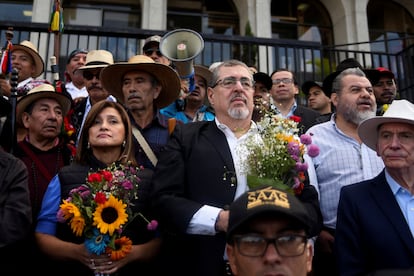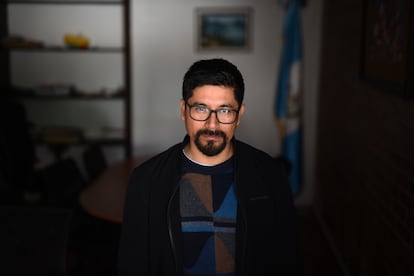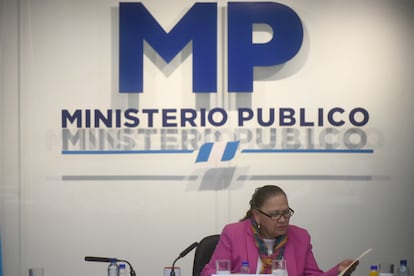Bernardo Arévalo’s countdown in Guatemala
The president-elect will assume power in the Central American country on January 14 amid enormous expectations. He will seek to make deep changes after almost half a year of overcoming obstacles and denouncing a coup d’état against him

On December 31, with the chimes that marked the arrival of the new year, another countdown began for Bernardo Arévalo: his inauguration as president of Guatemala, on January 14. It is a milestone that neither he nor the most optimistic of the members of his party — Movimiento Semilla (Seed Movement) — could imagine a little more than half a year ago. And instead of the transfer of power being smooth after his victory in the second round of the August elections, Arévalo’s path to the presidency has become an obstacle course.
In the more than four months that have passed since he was elected at the polls, the sociologist, congressman and diplomat, who is also an expert in conflict resolution, has several times denounced a coup d’état headed by the country’s Attorney General, Consuelo Porras. These attempts to derail the transition of power with a string of court cases have failed thanks to Guatemalans who have mobilized in great numbers in defense of democracy — led mainly by Indigenous peoples — and a strong condemnation from the international community that has not hesitated to criticize each offensive by the attorney general’s office to prevent the inauguration of the elected president.
Analysts consulted by EL PAÍS believe that in the coming days there may still be new attempts to overthrow Arévalo’s party through judicial means, but they also consider that there is little chance of them succeeding. Above all, after a ruling issued by the Constitutional Court in mid-December, which offered guarantees for Arévalo to don the presidential sash on January 14.
To become president, Bernardo Arévalo convinced the majority of Guatemalans with his firm anti-corruption message in a country that in recent years has faced serious democratic backsliding, with less and less independence between powers and with the persecution of judges, prosecutors, activists, journalists, and defenders of human rights who have highlighted or fought corruption.
“We knew it was going to be difficult, but not so brutal”
The president-elect and his team, made up mainly of young university students and progressive professionals from urban areas, knew that their proposal for change would encounter resistance from what in Guatemala they call the “corrupt pact.” This is an informal alliance of politicians, bureaucratic elites, and companies that protect each other in order to stay in power. But their own party members say they are surprised by the intensity of the attempts to sabotage the results, which is something they acknowledge has left them with less time to get ready for the transition.
“Ever since Semilla was founded, they put obstacles in our way. We have been constantly overcoming the barriers that the system put up, and we knew that they were not going to welcome us with open arms,” says Román Castellanos. He is one of the 23 deputies that the ruling party will have in Congress, where Arévalo’s party will be the third force. “We knew that it was going to be difficult, but not so brutal, or that the attack against the popular will would be so institutionalized, to delegitimize the electoral result and undermine the legitimacy of the elected president.”

Despite recognizing that this situation has taken away their time to work on the emergencies needed by a country with high levels of poverty and inequality and huge development challenges, Castellanos believes that the attacks have strengthened Arévalo. “The president-elect arrives with greater strength in his leadership and legitimacy at the national level because he has become a symbol of the fight for democracy, for fundamental freedoms and for respect for the fragile democratic institutions that we have left,” he says. For him, the rise to power of Arévalo and the elected vice president Karin Herrera will mean “containing democratic decline,” a requirement that, for Semilla, is essential to be able to work on the country’s other needs.
The main challenge: generating governance
Political scientist Marielos Chang agrees that the constant attacks have added to Arévalo’s popularity and political capital, but believes that these attacks may also have discouraged people from joining his government because they do not want to come in for criticism. For her, the main challenge of the president-elect will be to deliver the electoral promise that gave him victor, namely, the fight against corruption. It is an objective, she says, he can pursue in two ways: the legal prosecution of corruption cases, which is something that, in her judgment, will be difficult as long as Consuelo Porras continues as attorney general; and “drawing up the necessary reforms to be able to lay the foundations so that these major cases of corruption do not exist.”

Another challenge, she says, will be to achieve a certain level of governability with a Congress in which his party does not have a majority, and with courts such as the Court of Justice, that have opened various proceedings against the Seed Movement. “They have a knife at their neck that will limit them, but this does not mean that they will not be able to do a lot,” says Chang. “I believe that the political situation in Guatemala was at such a low level that there is an opportunity within the executive to make substantial changes that can be welcomed by the public.”
Among the changes that the analyst expects is to accelerate the hiring of people who are able to mobilize public services in key ministries such as education, health, and infrastructure, and also to promote greater transparency with the media. “We are also talking about a president that we hope will not persecute the press as Alejandro Giammattei’s government did,” she adds.
Whether the questionable Consuelo Porras remains as the country’s attorney general will undoubtedly be one of the great issues that will occupy the news in Guatemala in the coming months. Arévalo has said that one of the first things he will do as president will be to request the resignation of the woman he has accused of orchestrating the coup against him. “There are already enough arguments of abuse of power, of usurpation of functions, of flagrant violation of the Constitution to ask her to resign, which Giammattei did not do, but that Arévalo can do,” says former chancellor and political analyst Édgar Gutiérrez.
Gutiérrez believes that, in this scenario, Porras will dig in and put up resistance while waiting for the judicial system to protect her, which will generate tensions. “But with courts that act more independently, they can remove her. I think she will be left alone,” says the former chancellor. “For her criminal prosecution policy to be effective, Consuelo Porras needs to dance the tango, she needs a partner, meaning a complacent judicial system,” he adds. “If the judges examine the cases and say: ‘This does not hold up. This is not evidence,’ and begin to set limits, Consuelo Porras’s ability to carry on politically will be reduced.”
For Gutiérrez, it will also be essential for the president-elect to seek alliances and establish balances with businessmen and with Indigenous movements, which have safeguarded democracy through their mobilizations. “He must learn to generate a political culture of relationships with the private sector that are no longer based on privileges, as has been the case with all governments. Instead, they must be based on rules of competition, respect for tax law and labor law,” he says. In the case of Indigenous peoples, he believes that the president must have a very active presence in the territories to mediate against the companies that come to exploit local resources.
“I believe that there is a before and after in the political life of the country and the life of the Indigenous peoples as fundamental actors after these elections and after what we have experienced,” says Congressman Castellanos, who is originally from a Mayan community, the Q’eqchi’ of Cobán, in the department of Alta Verapaz. “From now on, Indigenous peoples will become a central actor in the country’s decisions because it has been the indigenous authorities and community representatives who have come out to mobilize in defense of democracy.”
Sign up for our weekly newsletter to get more English-language news coverage from EL PAÍS USA Edition
Tu suscripción se está usando en otro dispositivo
¿Quieres añadir otro usuario a tu suscripción?
Si continúas leyendo en este dispositivo, no se podrá leer en el otro.
FlechaTu suscripción se está usando en otro dispositivo y solo puedes acceder a EL PAÍS desde un dispositivo a la vez.
Si quieres compartir tu cuenta, cambia tu suscripción a la modalidad Premium, así podrás añadir otro usuario. Cada uno accederá con su propia cuenta de email, lo que os permitirá personalizar vuestra experiencia en EL PAÍS.
¿Tienes una suscripción de empresa? Accede aquí para contratar más cuentas.
En el caso de no saber quién está usando tu cuenta, te recomendamos cambiar tu contraseña aquí.
Si decides continuar compartiendo tu cuenta, este mensaje se mostrará en tu dispositivo y en el de la otra persona que está usando tu cuenta de forma indefinida, afectando a tu experiencia de lectura. Puedes consultar aquí los términos y condiciones de la suscripción digital.









































